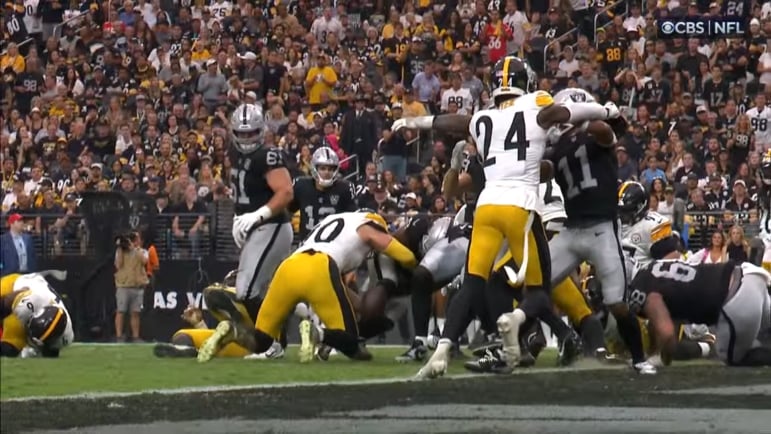Player: OLB T.J. Watt
Stock Value: Up
Reasoning: In a span of two weeks, T.J. Watt eclipsed both 100 career sacks and 30 career forced fumbles. In doing so, he became just the 20th player in NFL history to achieve both. He forced two fumbles for the Steelers on Sunday, both critical plays that set the table for a blowout win.
I have enjoyed the benefit of writing about a truly generational talent for the majority of my career. I began writing about football in 2012, and the Steelers drafted T.J. Watt in 2017. Between then and now, we have all run out of unique ways to express his dominance as a football player. That’s a good problem to have, but one we shouldn’t take for granted.
Let’s not forget that T.J. Watt just turned 30 years old in between his 100th sack and 30th forced fumble. While he could conceivably play another eight years (he is in his eighth year now), that would stretch the standards of longevity, even for his position. Cameron Heyward is still going strong at 35, but you never know when things might slip.
There is no slip from T.J. Watt, which we saw Sunday in Las Vegas. After a quiet game two weeks prior against a team committed to stopping him and getting the ball out quick, Watt forced his way into the conversation. With two tackles for loss and two forced fumbles, he put his stamp on the game. His second punchout forced a takeaway at the goal line, one of the most demoralizing plays in football.
While he isn’t quite on his usual pace with “only” 4.5 sacks through six games, T.J. Watt can always stack them in a hurry. He had a couple of sacks that the officials took away from him in the season opener, as you recall. And even when he isn’t making plays, he is absorbing valuable resources teams must commit to contain him.
As the season progresses, Steelers players’ stocks rise and fall. The nature of the evaluation differs with the time of year, with in-season considerations being more often short-term. Considerations in the offseason often have broader implications, particularly when players lose their jobs, or the team signs someone. This time of year is full of transactions, whether minor or major.
A bad game, a new contract, an injury, a promotion—any number of things affect a player’s value. Think of it as a stock on the market, based on speculation. You’ll feel better about a player after a good game, or worse after a bad one. Some stock updates are minor, while others are likely to be quite drastic, so bear in mind the degree. I’ll do my best to explain the nature of that in the reasoning section of each column.








